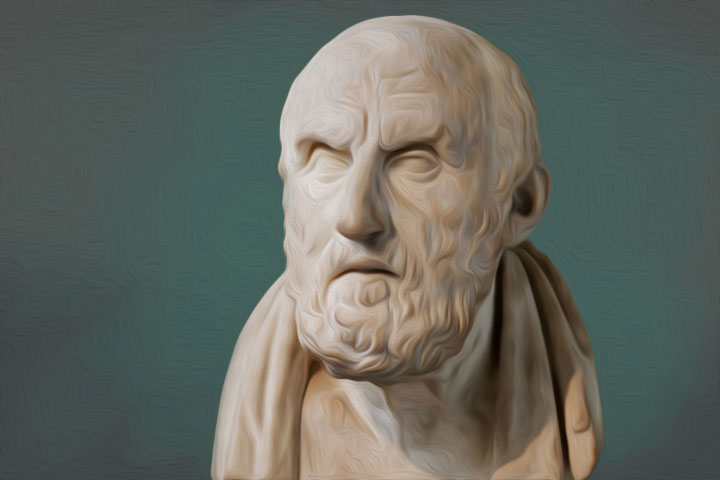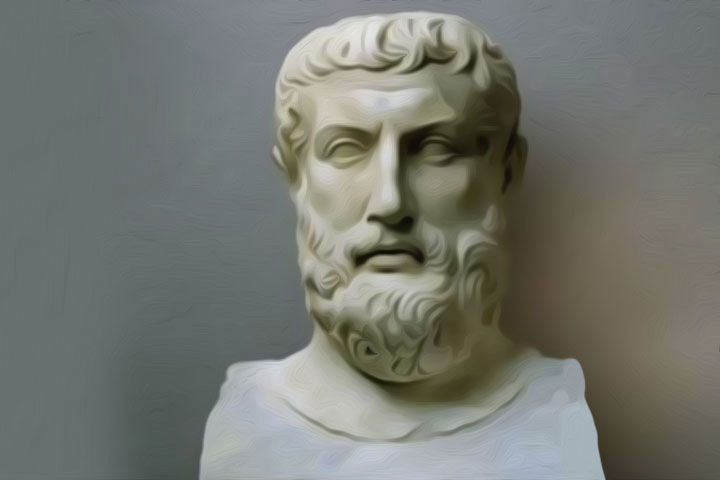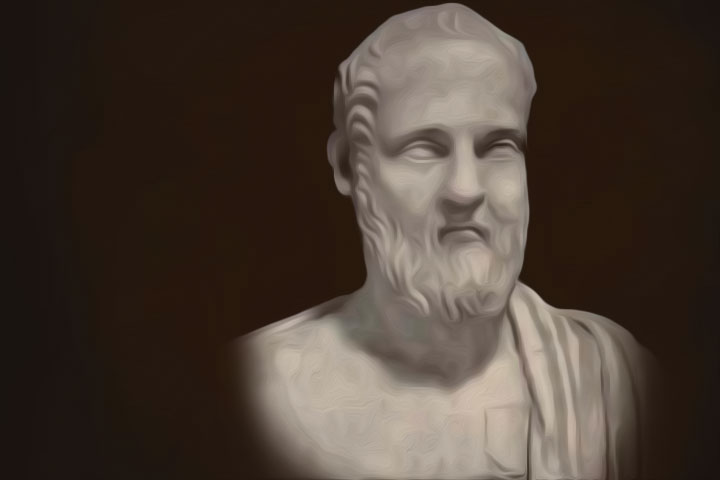
“There is no better test of a man's work than time, which also reveals the thoughts which lay hidden in his breast,” said Simonides, a nondescript bard who lived in ancient Greece. These words are aureate and commonplace, since it is well known that time shapes the thoughts of an individual. Obscure as he was for his grandiloquent poetry, Simonides only claim to fame lies in one major achievement that went unnoticed during his time: He inadvertently founded the basis of ‘Mnemonic Practice’- a branch of cognitive science and psychology. Mnemonic Practice is a branch of psychology that aims at studying memory in direct relation to places.
Mnemonics, in modern day psychology, is part of forensic studies used for investigating crime. While most branches of psychology trace their foundations to eminent thinkers and scientists, Mnemonics is the only sphere where a person who had little inkling of science or workings of the brain, helped establish a field of study on which research is ongoing to date, about 3000 years after the death of its founder- Simonides- a poet better known for using unscrupulous means for personal gain.

Simonides was born in 556BC, believed to be into a family of commoners who lived on the island of Ceos, also called Kos, in ancient Greece. His father Leoprepes was among the numerous music teachers that taught on the island.

Due to an ancient Hellenic tradition, choirs from villages and towns flocked to Delos, a city believed as the legendary birthplace of the Greco-Roman deity, Apollo. The choirs vied with one-another to win the highest accolades. Winners were rewarded lavishly by nobles and rulers and hence, singers and their teachers could look forward to a luxurious life. Consequently, Kos, like other cities in the region, boasted of several budding singers who required skilled music teachers, such as Simonides’ father.
Other details about Simonides family and his early childhood are not known since they were never clearly chronicled by any historian. That a poet called Simonides existed during this era is mentioned by a handful of later Roman poets such as Qunitilian and Cicero, who also wrote critical appreciation of his poems and recorded some legends surrounding this mysterious figure.
Simonides is credited as being a good learner who soon mastered and perfected the art of writing odes and eulogies praising nobles and prominent personalities. He mastered his distinctive form of writing, favouring concision by dispensing prolixity in his poems.
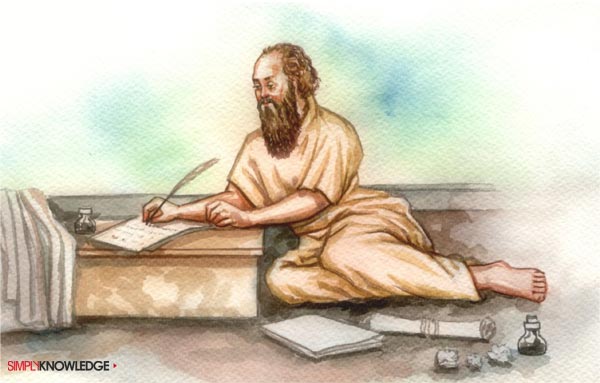
He was deeply superstitious, which reflected in his writings, where he attributed divine qualities of Athenian gods to people whom he praised through his poems.
Hence pompous odes and eulogies that extolled far more virtues than a person possessed, such as those penned by Simonides, gained instant popularity. They were highly favoured by tyrants of the era, whose intentions were to gain fame within a disgruntled populace. Fortune soon smiled on young Simonides, known for his unique style of poetry, when Athenian tyrant Peisistratos, invited him to Athens to write poems that depicted him and his coterie in favourable light.
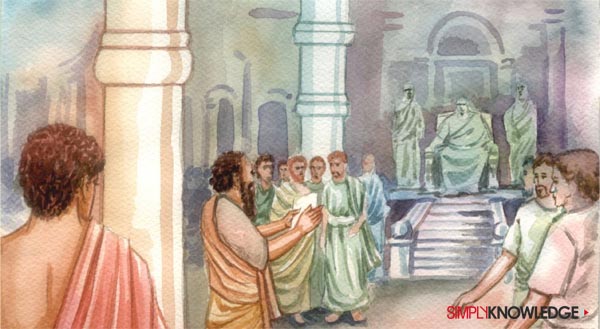

Lured by visions of an opulent life, Simonides relocated to Athens around 530BC to write poems for Peisistratos and his “beneficial” regime. Simonides recited these poetries during banquets and other grand events hosted by the tyrannical ruler and almost attained the rank of the Royal Poet.
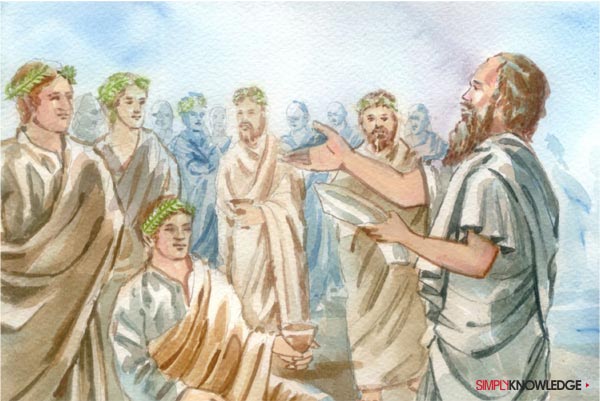
He enriched his personal coffers during Peisistratos’ regime.
But his ambitions were cut short when Peisistratos died in 527BC and was succeeded by his two sons, Hippias and Hipparchus, who ruled Athens jointly. The brother’s reign was largely beneficial to Athens despite some degree of despotism. Simonides thrived during their rule and amassed more wealth.
Political intrigue in Athens resulted in the assassination of Hipparchus in 514BC, by some close associates. The flattery Simonides heaped on Hipparchus can be gauged from his eulogy to Hipparchus, saying:“If noble death be virtue's foremost part, we above all men are by fortune blest, Striving with freedom's crown to honour Greece, we died, and here in endless glory, we rest.”
Hippias, became paranoid after the assassination of Hipparchus and ruled Athens with an iron fist. Simonides by now had earned the title of a ‘sophos’ or wise man, in ancient Greece.

This time, he used his “wisdom” for another purpose: Fearing he may be sucked into the vortex of Athenian politics and its inherent intrigues, Simonides fled to Thessaly, a city of the Byzantine Empire.

Despite suffering initial setbacks in relocating in Thessaly due to his Greek origin, Simonides, with his supine and subservient mannerisms, attracted the patronage of two major families of Thessaly- the Scopadae and Aleuadae. The two noble yet egocentric families vied with one-another for fame. Simonides, with his uncanny penchant for enriching himself, soon gained favour with Scopas, the head of the Scopadaes
Simonides curried favour with Scopas and soon emerged as the family’s favourite bard, who wrote in his unique style heaping praises upon their ancestry while attributing them with exaggerated qualities. Consequently, he was treated as a member of the Scopadae household.

Due to his excessive closeness to the family, Simonides soon became an irritant to Scopas, who had the dubious distinction of being a local hoodlum. As a result, Scopas would often warn Simonides, sometimes threatening him with dire consequences. But the poet and the ruffian always patched up since Simonides was obsequious, going great lengths to appease his benefactor.
Writers such as Cicero, Quintillian and comedy playwright Aristophanes depict Simonides as a servile miser: He would gatecrash banquets and parties hosted by aristocrats, hoping to attract more wealthy patrons- antics which angered Scopas.
Scopas, a narcissist, was an amateur wrestler who had won several accolades in local tournaments. Upon winning a prestigious local contest along with another athlete from Thessaly, Scopas asked Simonides to write an ode to celebrate the victory. He was to host a grand banquet to celebrate the win. Scopas offered lucrative remuneration to Simonides for the work.

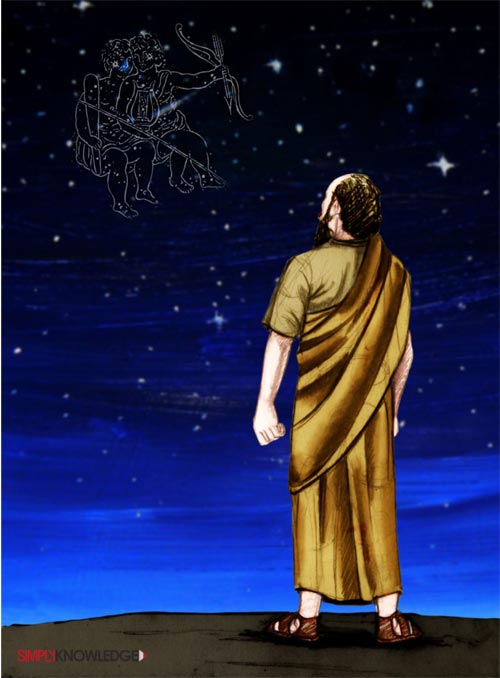
Superstitious and avaricious, Simonides wrote a poem praising Scopas and other athletes, attributing them with powers of Greco-Roman deities. Scopas and the co-athlete were compared to Gemini, the mythical twins. The poem was said to extol Gemini more than Scopas, who was infuriated when he read the draft. Scopas reneged on his promise of a handsome pay to Simonides and instead, disposed him off scornfully paying only half the amount. He asked the poet to collect the remainder from the Gemini twins- the mythical gods, on whom Simonides had heaped more praises.
Simonides viewed this derision of Gemini as blasphemy and was smarting from Scopas’ tirade against his work. He believed, Scopas had vilified gods and hence, some “divine justice” would soon befall his benefactor

Still reeling from vituperation meted by Scopas but hoping to earn some fees by composing odes for diners, Simonides entered the dining hall before other guests began arriving. As guests arrived, he made mental notes of where they were seated, hoping to write brief, poetic stanzas that would appeal to these nobles, thus accruing him some rewards. After all guests were seated, Simonides was preparing to recite his plaudits, when a guard informed the poet that “two brothers” were waiting outside the hall for an “urgent” talk.
Simonides exited the dining hall to meet his visitors but to his astonishment, found nobody on the streets. Believing this was a practical prank played by Scopas to level scores for writing an ode praising the Gemini twins, Simonides prepared to return to the dining hall in search of patrons.

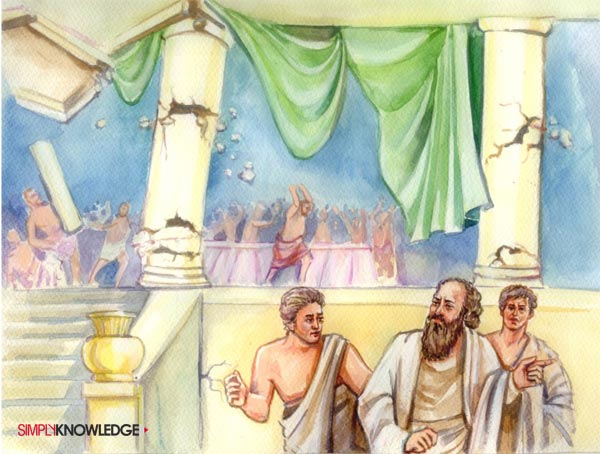
As he was about to enter the dining hall, Simonides experienced a tremor and heard a loud sound: The dining hall’s roof and pillars had collapsed. Diners who included nobles and their cohorts, servants and attendants as well as his patron Scopas, had perished within a few seconds of his absence. Simonides had a miraculous escape and was the sole survivor of the tragedy. The poet later attributed the close call to the Gemini twins, who supposedly had summoned him outside.

Lust for luxurious life drove Simonides to search for noble patrons, succeeding uncannily at every such attempt. In quest of such sponsors, Simonides befriended Heiron, a nobleman of Syracuse. Various unverifiable accounts of Simonedis last days in Sicily and Syracuse exist. It is widely believed, Simonedis died in 486BC in Sicily, enjoying opulent lifestyle, till his end.

Simonides, through his feat of identifying mortal remains of Roman nobles at the ill-fated dining hall of Scopas had directly laid the foundation of Mnemonics- the study of persons or objects related to places or spaces in direct relation with human memory. He thus holds the unique distinction of being the first person in the world to point out the importance of memory as essential for humans. Mnemonics now is a well defined and much studied branch of cognitive psychology.

Simonedes also expounded that every man, in adverse conditions and calamities, is likely to resort to unfair or illicit means to survive. This thought arises from his own experience of fleeing Thessaly fearing political unrest. Explained simply, it denotes, every human being will behave well and live in conformity with accepted societal norms, traditions, rules and regulations, when content and happy. However, the same person, when confronted with extraordinary stress or disastrous circumstances leading to sorrow, may resort to some form of crime. These statements are aptly reflected in modern criminal psychology that studies behaviour of perfectly normal human beings who resort to bestiality when over stressed by some insurmountable situation.

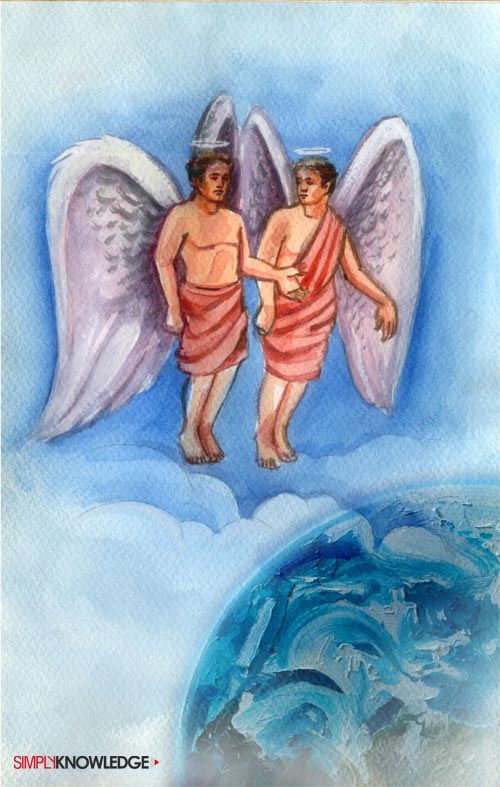
Simonedes stated that Gods too could not resist necessity- a theory that remains highly debatable in spiritual terms. This theory is debated as several religions state that God Almighty sent messiahs to Earth to teach them righteous living. Thus, if God had no necessity to reach out to humans, the requirement to send messengers or prophets would never arise.
Next Biography








